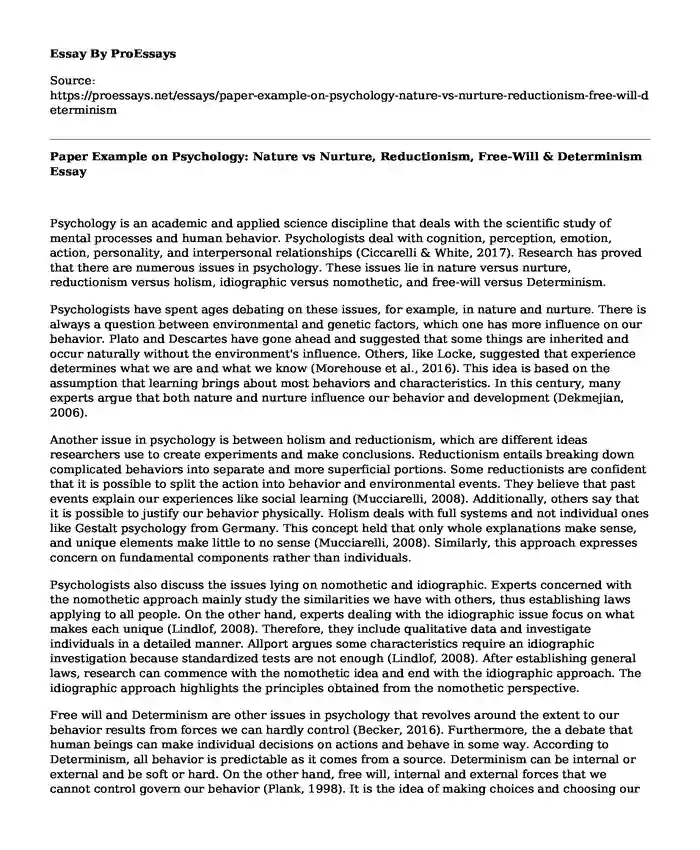Psychology is an academic and applied science discipline that deals with the scientific study of mental processes and human behavior. Psychologists deal with cognition, perception, emotion, action, personality, and interpersonal relationships (Ciccarelli & White, 2017). Research has proved that there are numerous issues in psychology. These issues lie in nature versus nurture, reductionism versus holism, idiographic versus nomothetic, and free-will versus Determinism.
Psychologists have spent ages debating on these issues, for example, in nature and nurture. There is always a question between environmental and genetic factors, which one has more influence on our behavior. Plato and Descartes have gone ahead and suggested that some things are inherited and occur naturally without the environment's influence. Others, like Locke, suggested that experience determines what we are and what we know (Morehouse et al., 2016). This idea is based on the assumption that learning brings about most behaviors and characteristics. In this century, many experts argue that both nature and nurture influence our behavior and development (Dekmejian, 2006).
Another issue in psychology is between holism and reductionism, which are different ideas researchers use to create experiments and make conclusions. Reductionism entails breaking down complicated behaviors into separate and more superficial portions. Some reductionists are confident that it is possible to split the action into behavior and environmental events. They believe that past events explain our experiences like social learning (Mucciarelli, 2008). Additionally, others say that it is possible to justify our behavior physically. Holism deals with full systems and not individual ones like Gestalt psychology from Germany. This concept held that only whole explanations make sense, and unique elements make little to no sense (Mucciarelli, 2008). Similarly, this approach expresses concern on fundamental components rather than individuals.
Psychologists also discuss the issues lying on nomothetic and idiographic. Experts concerned with the nomothetic approach mainly study the similarities we have with others, thus establishing laws applying to all people. On the other hand, experts dealing with the idiographic issue focus on what makes each unique (Lindlof, 2008). Therefore, they include qualitative data and investigate individuals in a detailed manner. Allport argues some characteristics require an idiographic investigation because standardized tests are not enough (Lindlof, 2008). After establishing general laws, research can commence with the nomothetic idea and end with the idiographic approach. The idiographic approach highlights the principles obtained from the nomothetic perspective.
Free will and Determinism are other issues in psychology that revolves around the extent to our behavior results from forces we can hardly control (Becker, 2016). Furthermore, the a debate that human beings can make individual decisions on actions and behave in some way. According to Determinism, all behavior is predictable as it comes from a source. Determinism can be internal or external and be soft or hard. On the other hand, free will, internal and external forces that we cannot control govern our behavior (Plank, 1998). It is the idea of making choices and choosing our behavior. For example, a person can choose whether to commit a crime or leave the matter, making themselves responsible for their actions. Unfortunately, it is not easy to use pure free will or deterministic approaches in studying human behavior.
References
Becker, S. (2016). Free Will vs. Determinism: Discovery Service for Fayetteville Technical Community College. Eds.b.ebscohost.com. Retrieved 7 September 2020, from https://eds.b.ebscohost.com/eds/detail/detail?vid=0&sid=52ca21fa-b7f5-4ac3-8244-94d9124317f7%40sessionmgr103&bdata=JnNpdGU9ZWRzLWxpdmU%3d#AN=111547137&db=a9h.
Ciccarelli, S., & White, J. (2017). Psychology (5th ed.). NY, NY: Pearson,
Dekmejian, R. (2006). The Psychology of resolving global conflicts: from war to peace: v.1: Nature vs. nurture; v.2: Group and social factors; v.3: Interventions. Choice Reviews Online, 44(04), 44-2406-44-2406. https://doi.org/10.5860/choice.44-2406
Lindlof, T. (2008). The International Encyclopaedia of Communication (1st ed.). John Wiley & Sons, Inc.
Morehouse, A., Graves, T., Mikle, N., & Boyce, M. (2016). Nature vs. Nurture: Evidence for Social Learning of Conflict Behaviour in Grizzly Bears. PLOS ONE, 11(11), e0165425. https://doi.org/10.1371/journal.pone.0165425
Mucciarelli, M. (2008). Codes, models, and reality: reductionism vs. holism in a review of micro zonation studies in the Umbria-Marche region. Doaj.org. Retrieved 7 September 2020, from https://doaj.org/article/59e0d30e3aa4461b9510d5c01adcbaae.
Plank, G. (1998). The Changing Country of Anthony Casteel: Language, Religion, Geography, Political Loyalty, and Nationality in Mid-Eighteenth-Century Nova Scotia. Studies in Eighteenth-Century Culture, 27(1), 53-74. https://doi.org/10.1353/sec.2010.0277
Cite this page
Paper Example on Psychology: Nature vs Nurture, Reductionism, Free-Will & Determinism. (2023, Dec 02). Retrieved from https://proessays.net/essays/paper-example-on-psychology-nature-vs-nurture-reductionism-free-will-determinism
If you are the original author of this essay and no longer wish to have it published on the ProEssays website, please click below to request its removal:
- 13 Reasons Why Critical Essay
- Paper Example on Concept of Sociology of Emotions
- How Aging, Ethnicity, Life Circumstances and Disease Have Affected an Aging Adult? - Essay Sample
- Research Paper on Psychotherapy
- Worldview Analysis and Personal Inventory Paper Example
- Essay Sample on Finding Meaning in Life
- Paper Example on One Week of Silence: A Life-Changing Mental Therapy







